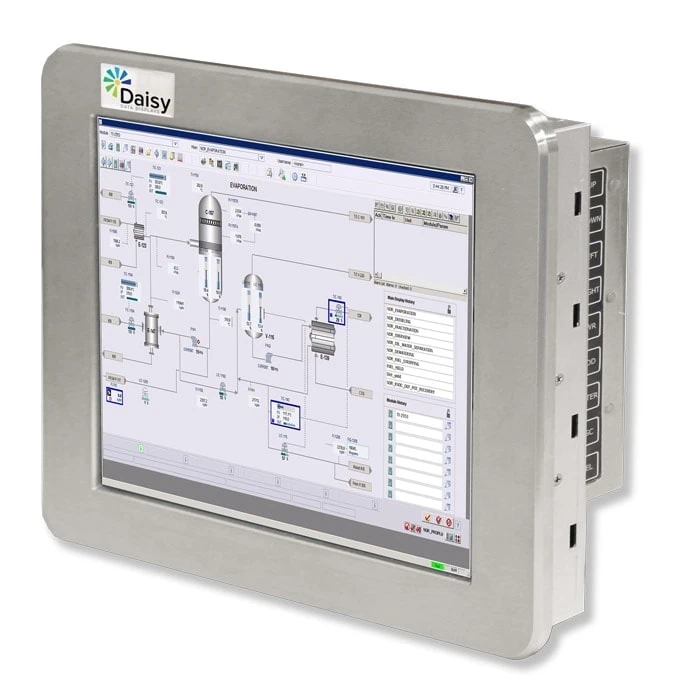What Is an Industrial PC?
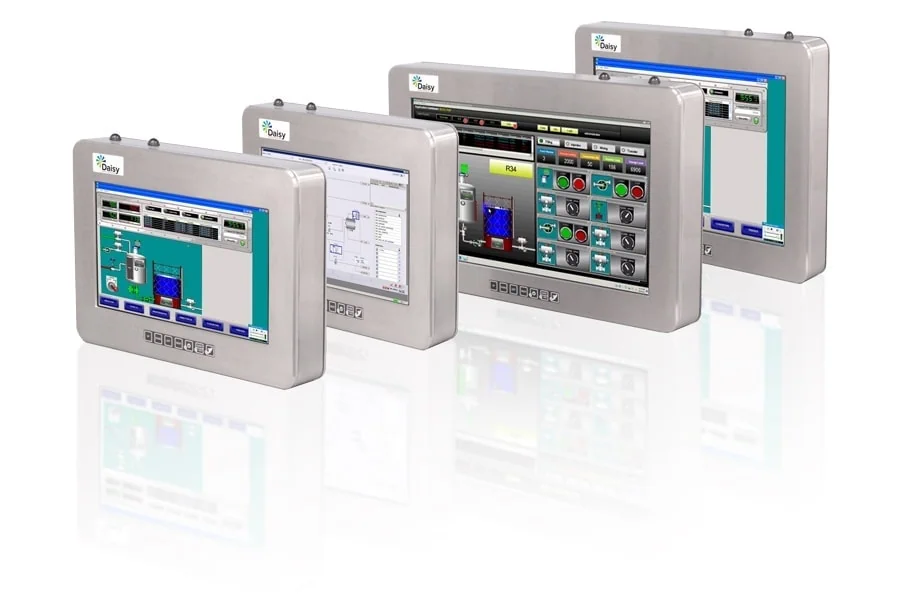
The basic features of an industrial PC include:
- Ventless and fanless design
- The ability to withstand vibrations and harsh environments
- Easy configuration
- Comprehensive I/O options
- Extended lifecycles
- Durable components
Knowing how to choose an industrial PC for your application is essential to your facility’s productivity and efficiency. Learn more about the main types of PCs, considerations when selecting one for your facility, key benefits, typical applications, and more.
Common Types of Industrial PCs
There are three main types of industrial PCs, all of which utilize an integrated touch display.
Industrial Panel PCs (IPPCs)
Considered the most robust and durable type of industrial PC, an IPPC is beneficial for use in heavy-duty industrial applications, such as automotive, steel manufacturing, dairy, and meat processing plants. Equipped with capacitive or resistive touch sensors, these PCs can be operated by gloved personnel. Capable of handling the most environmentally challenging applications, IPPCs are the most I/O intensive of all industrial PC types and include the following features:
- Installed I/O cards
- Redundant Array of Independent Disks (RAIDs) and ports
- Multiple drives
- PCI/PCIe expansion slots
Panel PCs (PPCs)
Designed for a wide variety of light industrial tasks, PPCs provide ample input and output expansion options and are the most affordable type of industrial PC. Screen options include a widescreen with multi-touch features or a standard 4:3 screen with a resistive touchscreen. Sizes range from 6.5 inches to 42 inches.
Touch Panel PCs (TPPCs)
Designed for standard industrial applications, TPPCs are fanless, SCADA-ready, and have a slim profile with a thin client terminal. Screen sizes range between 6.5 inches and 42 inches. These rugged units have a cast aluminum enclosure and operate on Android or Windows operating systems. TPPCs typically have the least amount of I/O available compared to other types of industrial PCs.
Industrial PCs can feature the following characteristics and mounting options depending on the demands of the specific application:
- Fully enclosed
- In-wall
- Wall-mounted
- VESA-mounted
- Swing arm
- Fold down
- Pedestal
- Purged
- Non-purged
Materials
Industrial PC enclosures and displays are constructed using a variety of materials, including:
- Enclosure
- Aluminum
- Stainless steel
- Carbon fiber or composites
- Display
- Polycarbonate
- Glass
- Lexan
Choosing the Best Industrial PC
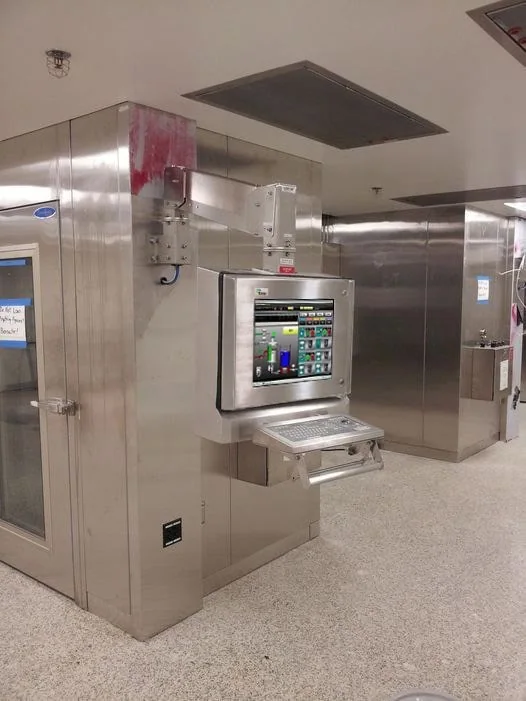
Mounting Styles
There is a variety of mounting styles available:
- Original equipment manufacturer (OEM)
- Articulating swing arm
- In-wall flush mount
- Wall-mounted
- VESA-mounted
- VESA arm
- Desktop
- Pedestal
- Rack-mounted
- Panel-mounted
Processor (CPU)
The central processing unit (CPU) follows instructions from computer programs to process, store, and calculate data. As the brain of the computer, the CPU must meet the specific demands of its intended application. Processor options for an industrial PC include the following:
- 1.91 GHz Intel® Atom™ E3845, Quad Core
- 1.91 GHz Intel® Atom™, Quad Core
- 2.0 GHz (2.8 GHz Turbo) Intel® i7-620LE 8GB RAM
- 2.60 GHz (3.4 GHz Turbo) Intel® i7-6600U, Dual Core
Ratings
Ratings for industrial PCs can include the following:
[table id=1 /]
Environments
Depending on your needs, choose between these types of industrial PCs:
- Harsh or rugged
- Protected or non-rugged
- Hazardous Area
Application/Industry Use
Industrial computer systems are used in a broad range of industries and applications, including but not limited to:
- Aerospace and defense
- Air traffic control
- Automotive
- Flight simulation
- Food processing
- Life science
- Machine tooling
- Marine
- Oil and gas
- Packaging
- Paint and coating
- Petrochemical
- Pulp and paper
- Rubber and plastic
- Transportation
Connectivity
Depending on your application, select from standard or specialized connectivity:
- Standard:
- USB, CAT-5 Network
- Secured
- Dustproof
- Specialized:
- Hot swappable connectors
- Hazardous areas
- Military
Operating System
Industrial computers are compatible with Windows, Linux, or PLC operating systems.
Storage, Memory, and Expansion
Storage, memory, and expansion options include:
- i5, i7
- 816 and a2
- Atom processor
- Ram:
- 8
- 16
- 32
- Hard Drive:
- 500 GB
- Solid State Drives:
- 128 GB
Display Size
The display of industrial PCs varies based on the type of equipment, with the following size options:
- 6.5 in
- 10.4 in
- 12.1 in
- 15 in
- 15.6 in
- 17.3 in
- 19 in
- 20.1 in
- 21.5 in
- 24 in
- 27 in
- 42 in
Key Features and Benefits
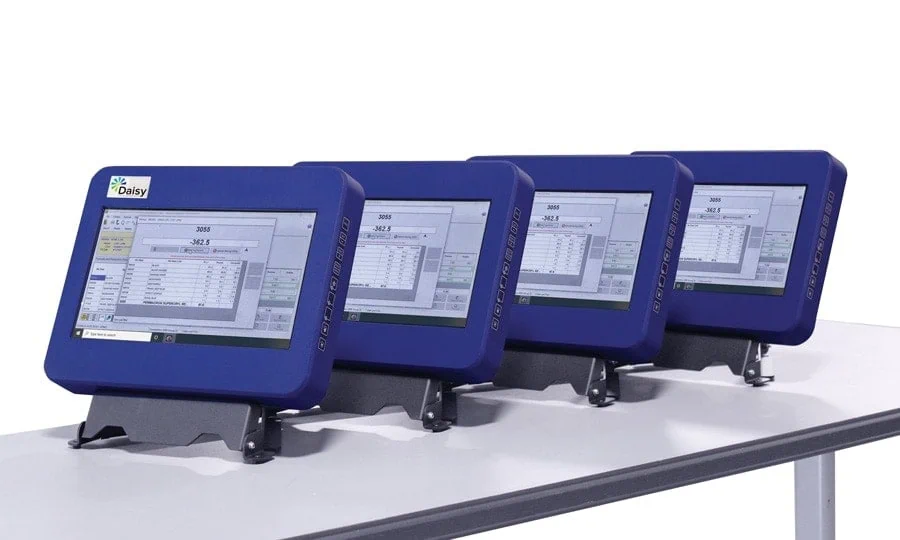
- Operate in extreme heat and cold
- Resist vibration and shock
- Resist debris and dust due to their fanless design
Applications
Manufacturing
Many commercial and industrial manufacturers rely on industrial computers for robot guidance and machine vision. Industrial PCs can also collect data from equipment and machinery to implement processes for preventative maintenance.
Packaging Inspection & Quality Control
Packaging inspection and machine vision systems allow food packaging plants and other manufacturers to automate quality control processes, increasing efficiency and productivity.
Asset Tracking
Healthcare and retail sectors utilize industrial PC hardware in daily operations, tracking and monitoring processes and assets for any abnormalities or inconsistencies.
Simulation & Control
Industrial PCs have powerful processors that can create and emulate simulations of real-world scenarios, giving insights into:
- Analyzing potential risks
- Predicting future possibilities
- Testing systems in any framework
Remote Data Management
Remote Internet of Things (IoT) sensors can send and receive data related to the use of remote equipment, hardware, tools, and other connected devices. Machine operators can deploy the sensors to collect actionable data regarding equipment fatigue, operational processes, and overall performance.
Chemical, Pharmaceutical, and Food Processing
Industrial computers can operate reliably in hazardous areas where flammable vapors and chemicals are present. They can be purged to be made safe for these volatile environments. Often aseptic, industrial PCs can be cleaned with high pressure for use in sterile environments.
OEMs
Industrial PCs allow operators to send controls and commands for systems and machinery, display data from them, or both. Equipped with a user-friendly human-machine interface (HMI), industrial computers facilitate the easy control and monitoring of industrial equipment.
Integrators
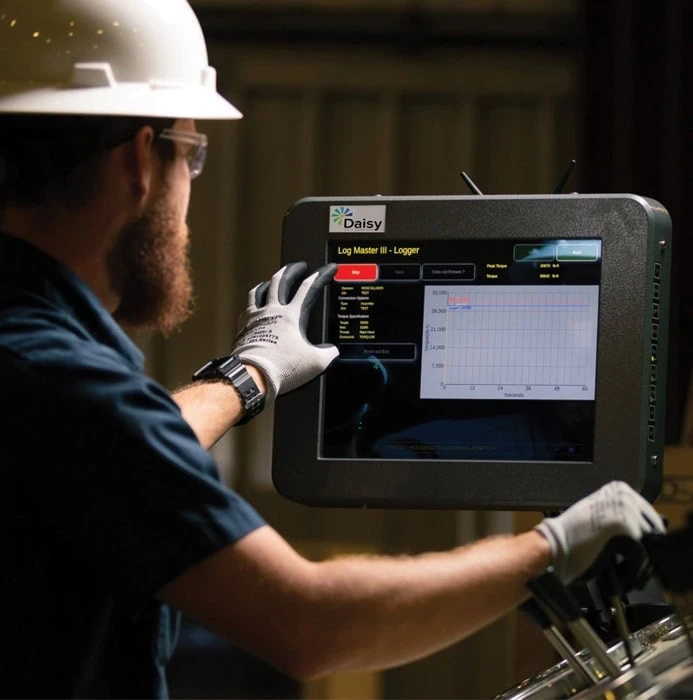
Daisy Data Displays brings 40 years of experience and institutional knowledge when working with system integrators to select the right product for a specific application. We offer a vast selection of base models and can customize them for particular needs, providing affordable tailored solutions for integrators without unnecessary NRE charges. Daisy Data Displays engineers work alongside integrators throughout every project to ensure continued reliability and successful operation.
Why Daisy Data Displays?
As a leading manufacturer of durable industrial PCs and display solutions, Daisy Data Displays produces off-the-shelf and customized solutions for a variety of demanding industrial applications, including but not limited to:
- Chemical
- Flight simulation
- Food processing
- Manufacturing
- Military
- Oil and gas exploration
- Pharmaceutical
With more than 40 years of industry experience, Daisy Data Displays’ production and engineering teams collaborate to design, construct, and test our line of rugged industrial computers, monitors, purge controls, workstations, keyboards, and accessories. All our products are manufactured to provide long-lasting performance in a wide variety of applications.

